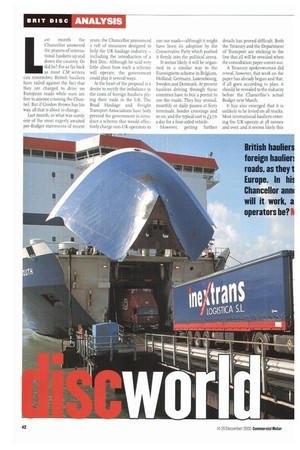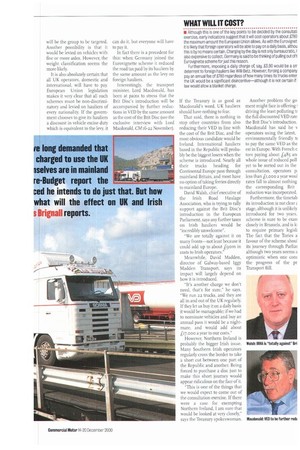L ast month the Chancellor answered the prayers of international hauliers
Page 44

Page 45

If you've noticed an error in this article please click here to report it so we can fix it.
up and down the country. Or did he? For as far back as most CM writers can remember. British hauliers have railed against the fact that they are charged to drive on European roads while ours are free to anyone crossing the Channel. But if Gordon Brown has his way, all that is about to change.
Last month, in what was surely one of the most eagerly awaited pre-Budget statements of recent years, the Chancellor announced a raft of measures designed to help the UK haulage industry— including the introduction of a Brit Disc. Although he said very little about how such a scheme will operate, the government could play it several ways.
At the heart of the proposal is a desire to rectify the imbalance in the costs of foreign hauliers plying their trade in the UK. The Road Haulage and Freight Transport Associations have both pressed the government to introduce a scheme that would effectively charge non-UK operators to use our roads—although it might have been its adoption by the Conservative Party which pushed it firmly into the political arena.
It seems likely it will be organised in a similar way to the Eurovignette scheme in Belgium, Holland, Germany, Luxembourg, Sweden and Denmark. At present hauliers driving through these countries have to buy a permit to use the roads. They buy annual, monthly or daily passes at ferry terminals, border crossings and soon, and the typical cost is f3.7o a day for a four-axled vehide.
However, getting further details has proved difficult. Both the Treasury and the Department of Transport are sticking to the line that all will be revealed when the consultation paper comes out.
A Treasury spokeswoman did reveal, however, that work on the paper has already begun and that, if all goes according to plan, it should be revealed to the industry before the Chancellor's actual Budget next March.
It has also emerged that it is unlikely to be levied on all trucks. Most international hauliers entering the UK operate at 38 tonnes and over, and it seems likely this
will be the group to be targeted. Another possibility is that it would be levied on vehicles with five or more axles. However, the weight classification seems the more likely It is also absolutely certain that all UK operators. domestic and international, will have to pay. European Union legislation makes it very clear that all such schemes must be non.discriminatory and levied on hauliers of every nationality. If the government chooses to give its hauliers a discount in vehicle excise duty which is equivalent to the levy, it can do it, but everyone will have to pay it.
In fact there is a precedent for this: when Germany joined the Eurovignette scheme it reduced the road tax paid by its hauliers by the same amount as the levy on foreign hauliers.
Interestingly, the transport minister, Lord Macdonald, has been at pains to stress that the Brit Disc's introduction will be accompanied by further reductions in VED by the same amount as the cost of the Brit Disc (see the exclusive interview with Lord Macdonald, CM16-22 November).
If the Treasury is as good as Macdonald's word, UK hauliers should have nothing to fear.
That said, there is nothing to stop other countries from also reducing their VED in line with the cost of the Brit Disc, and the most obvious candidate would be Ireland. International hauliers based in the Republic will probably he the biggest losers when the scheme is introduced. Nearly all their trucks heading for Continental Europe pass through mainland Britain, and most have no option of taking ferries directly to mainland Europe.
David Walsh, chief executive of the Irish Road Haulage Association, who is trying to rally support against the Brit Disc's introduction in the European Parliament, says any further taxes on Irish hauliers would be "incredibly unwelcome".
"We are totally against it on many fronts—not least because it could add up to about f 9om in costs to Irish operators," Meanwhile, David Madden, director of Galway-based I ggy Madden Transport, says its impact will largely depend on how it is introduced.
"It's another charge we don't need, that's for sure," he says. "We run 22 trucks, and they are all in and out of the UK regularly. If they let us buy it on a daily basis it would be manageable; if we had to nominate vehicles and buy an annual pass it would be a nightmare, and would add about L17,000 a year to our costs."
However, Northern Ireland is probably the bigger Irish issue. Many Southern Irish operators regularly cross the border to take a short cut between one part of the Republic and another. Being forced to purchase a disc just to make this short journey would appear ridiculous on the face of it.
"This is one of the things that we would expect to come out of the consultation exercise. If there were a case for exempting Northern Ireland. I am sure that would be looked at very closely," says the Treasury spokeswoman.
Another problem the go ment might face is offering driving the least polluting ti the full discounted VED rate the Brit Disc's introduction. Macdonald has said he v operators using the latest, environmentally friendly ti to pay the same VED as the est in Europe. With French tors paying about £485 an whole issue of reduced poll yet to be sorted out in the consultation, operators p. less than £1,000 a year woul rates fall to almost nothing the corresponding Brit reduction was incorporated.
Furthermore, the timetab its introduction is not clear stage, although it is unlikely introduced for two years. scheme is sure to be exan closely in Brussels, and is ki to require primary legish The fact that the Tories a favour of the scheme shoul its journey through Parliai although two years seems a optimistic when one corn the progress of the pr Transport Bill,




































































































